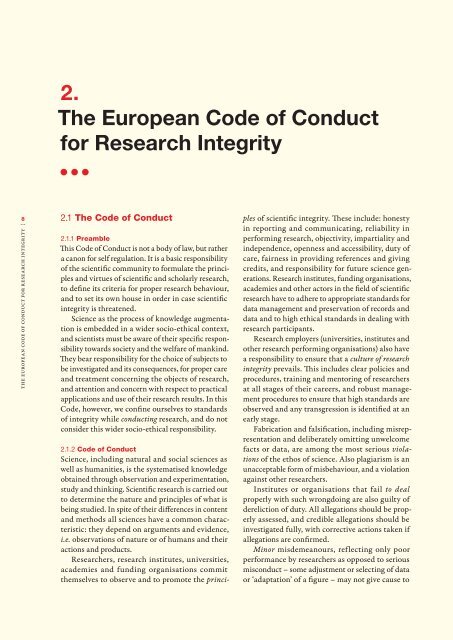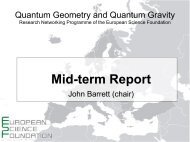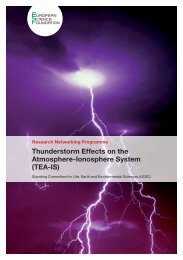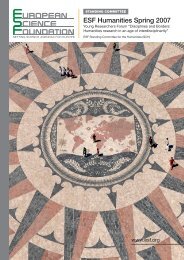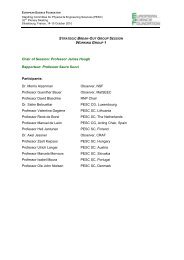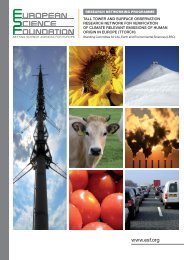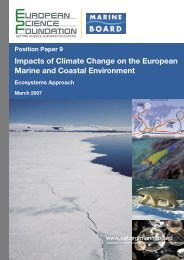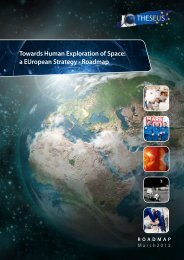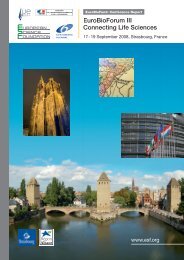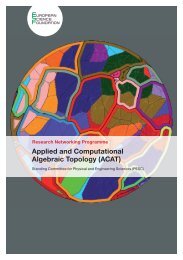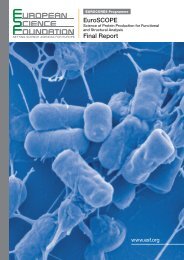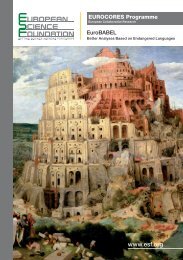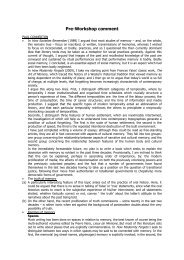2.<strong>The</strong> <strong>European</strong> <strong>Code</strong> <strong>of</strong> <strong>Conduct</strong><strong>for</strong> <strong>Research</strong> <strong>Integrity</strong>l l l8 2.1 <strong>The</strong> <strong>Code</strong> <strong>of</strong> <strong>Conduct</strong><strong>The</strong> <strong>European</strong> <strong>Code</strong> <strong>of</strong> <strong>Conduct</strong> <strong>for</strong> <strong>Research</strong> <strong>Integrity</strong>2.1.1 PreambleThis <strong>Code</strong> <strong>of</strong> <strong>Conduct</strong> is not a body <strong>of</strong> law, but rathera canon <strong>for</strong> self regulation. It is a basic responsibility<strong>of</strong> the scientific community to <strong>for</strong>mulate the principlesand virtues <strong>of</strong> scientific and scholarly research,to define its criteria <strong>for</strong> proper research behaviour,and to set its own house in order in case scientificintegrity is threatened.Science as the process <strong>of</strong> knowledge augmentationis embedded in a wider socio-ethical context,and scientists must be aware <strong>of</strong> their specific responsibilitytowards society and the welfare <strong>of</strong> mankind.<strong>The</strong>y bear responsibility <strong>for</strong> the choice <strong>of</strong> subjects tobe investigated and its consequences, <strong>for</strong> proper careand treatment concerning the objects <strong>of</strong> research,and attention and concern with respect to practicalapplications and use <strong>of</strong> their research results. In this<strong>Code</strong>, however, we confine ourselves to standards<strong>of</strong> integrity while conducting research, and do notconsider this wider socio-ethical responsibility.2.1.2 <strong>Code</strong> <strong>of</strong> <strong>Conduct</strong>Science, including natural and social sciences aswell as humanities, is the systematised knowledgeobtained through observation and experimentation,study and thinking. Scientific research is carried outto determine the nature and principles <strong>of</strong> what isbeing studied. In spite <strong>of</strong> their differences in contentand methods all sciences have a common characteristic:they depend on arguments and evidence,i.e. observations <strong>of</strong> nature or <strong>of</strong> humans and theiractions and products.<strong>Research</strong>ers, research institutes, universities,academies and funding organisations committhemselves to observe and to promote the principles<strong>of</strong> scientific integrity. <strong>The</strong>se include: honestyin reporting and communicating, reliability inper<strong>for</strong>ming research, objectivity, impartiality andindependence, openness and accessibility, duty <strong>of</strong>care, fairness in providing references and givingcredits, and responsibility <strong>for</strong> future science generations.<strong>Research</strong> institutes, funding organisations,academies and other actors in the field <strong>of</strong> scientificresearch have to adhere to appropriate standards <strong>for</strong>data management and preservation <strong>of</strong> records anddata and to high ethical standards in dealing withresearch participants.<strong>Research</strong> employers (universities, institutes andother research per<strong>for</strong>ming organisations) also havea responsibility to ensure that a culture <strong>of</strong> researchintegrity prevails. This includes clear policies andprocedures, training and mentoring <strong>of</strong> researchersat all stages <strong>of</strong> their careers, and robust managementprocedures to ensure that high standards areobserved and any transgression is identified at anearly stage.Fabrication and falsification, including misrepresentationand deliberately omitting unwelcomefacts or data, are among the most serious violations<strong>of</strong> the ethos <strong>of</strong> science. Also plagiarism is anunacceptable <strong>for</strong>m <strong>of</strong> misbehaviour, and a violationagainst other researchers.Institutes or organisations that fail to dealproperly with such wrongdoing are also guilty <strong>of</strong>dereliction <strong>of</strong> duty. All allegations should be properlyassessed, and credible allegations should beinvestigated fully, with corrective actions taken ifallegations are confirmed.Minor misdemeanours, reflecting only poorper<strong>for</strong>mance by researchers as opposed to seriousmisconduct – some adjustment or selecting <strong>of</strong> dataor ‘adaptation’ <strong>of</strong> a figure – may not give cause to
a <strong>for</strong>mal charge. Minor misdemeanours by studentsor junior researchers should however alwaysbe reprimanded and corrected by teachers or mentors.Minor misdemeanours by more experiencedresearchers that leads to misrepresentation may betreated more seriously, and if repeated should beconsidered as misconduct.In addition to the violation <strong>of</strong> the fundamentalprinciples <strong>of</strong> responsible science many other<strong>for</strong>ms <strong>of</strong> poor and inappropriate practices in scienceresearch deserve attention. <strong>The</strong>se include poordata practices and inadequate data management,inappropriate research procedures, including questionableprocedures <strong>for</strong> obtaining in<strong>for</strong>med consent,insufficient respect and care <strong>for</strong> participants in theresearch, improper research design and carelessnessin observation and analysis, unsuitable authorshipor publishing practices, and reviewing and editorialderelictions. Some <strong>of</strong> these are very serious anddiscreditable, e.g. abuse <strong>of</strong> ethical requirements and<strong>of</strong> trust in relation to the public, research subjects orother participants in the research. However, unlikethe fundamental principles <strong>of</strong> scientific integrityand the violation there<strong>of</strong>, which have a universalcharacter, such practices may be subject to differentnational traditions, legislative regulations or institutionalprovisions. A required system <strong>of</strong> regulations <strong>of</strong>good practice in research should, there<strong>for</strong>e, (except<strong>for</strong> gross violations <strong>of</strong> ethical principles or the law)not be part <strong>of</strong> a universal <strong>Code</strong> <strong>of</strong> <strong>Conduct</strong>, butshould be developed in the <strong>for</strong>m <strong>of</strong> national GoodPractice Rules, that would recognise the legitimatedifferences between national or institutional systems.<strong>The</strong> enclosed list <strong>of</strong> recommendations shouldbe used as a guideline <strong>for</strong> the <strong>for</strong>mulation <strong>of</strong> suchnational Good Practice Rules.Investigations <strong>of</strong> research misconduct allegationsshould be consistent with national laws <strong>of</strong> thecountry in which the investigations are conducted.What is required is a due and fair process, that isuni<strong>for</strong>m and sufficiently rapid, and leads to properoutcomes and sanctions. <strong>The</strong> investigations must becarried out in accordance with the highest standards<strong>of</strong> process integrity, uni<strong>for</strong>mity within onedomain <strong>of</strong> jurisdiction, and fairness to all parties.Confidentiality should be observed as much as possible,unnecessary detriment to reputations shouldbe avoided, and a proportionate action should betaken against persons found to have committedresearch misconduct. Wherever possible precautionshould be taken to ensure that investigations arecarried through to a conclusion. <strong>The</strong>y should notcease, leaving questions unresolved, merely becausethe defaulter has left the institution.In international collaboration partners shouldagree to conduct their research according to thesame standards <strong>of</strong> research integrity, and to bringany suspected deviation from these standards, inparticular alleged research misconduct, to theimmediate attention <strong>of</strong> the project leader(s) (and<strong>of</strong> the senior responsible <strong>of</strong>ficer in the universityor institute (employer), in order <strong>for</strong> it to be investigatedaccording to the policies and procedures <strong>of</strong>the partner with the primary responsibility, whilerespecting the laws and sovereignty <strong>of</strong> the States <strong>of</strong>all participating parties. In large scale, funded internationalprojects the promotion <strong>of</strong> good practiceand the handling <strong>of</strong> possible cases <strong>of</strong> misconduct,as recommended by the coordinating committee <strong>of</strong>the OECD Global Science Forum, should be followed.<strong>The</strong> boiler plate text, recommended by this committee,should be embodied in the <strong>for</strong>mal documentsthat establish the collaborative project.2.2 Background and ElucidationIn this section a more extensive elucidation <strong>of</strong> thecondensed <strong>Code</strong> <strong>of</strong> <strong>Conduct</strong>, presented in chapter 1,is given. <strong>The</strong> nature <strong>of</strong> science and scholarship, thevalues to be fostered in scientific and scholarlyresearch, the various discreditable <strong>for</strong>ms <strong>of</strong> misconductwill be discussed, and procedures <strong>for</strong> dealingwith allegations <strong>of</strong> misconduct and rules <strong>for</strong> goodresearch practice will be recommended.2.2.1 Nature <strong>of</strong> science and scholarshipIn a broad sense science (in Latin scientia is knowledge)is the systematised knowledge obtainedthrough observation and experimentation, studyand thinking. It is rooted in human curiosity, thewish to understand the physical, biological andsocial worlds as well as the human mind and itsproducts. Science aims at deepening our understandingand extending our knowledge beyond whatis already known. <strong>The</strong> term ‘science’ is normallyapplied only to the natural and social sciences; inthis document it will be applied in a broader sense,like the German word ‘Wissenschaft’, which appliesalso to the humanities. Of course, there are differencesbetween the various disciplines, sometimeseven indicated as ‘cultural’1, but in this discussionemphasis will be laid on the communalities ratherthan the disparities between the disciplines.1. C.P. Snow (1959), <strong>The</strong> Rede lecture. Cambridge:Cambridge University Press.W. Leppenies (1985), Die drei Kulturen; Sociologie zwischenLiteratur und Wissenschaft. München: Hanser.9<strong>The</strong> <strong>European</strong> <strong>Code</strong> <strong>of</strong> <strong>Conduct</strong> <strong>for</strong> <strong>Research</strong> <strong>Integrity</strong>


